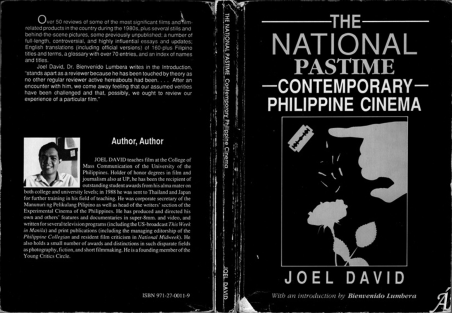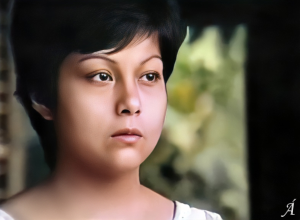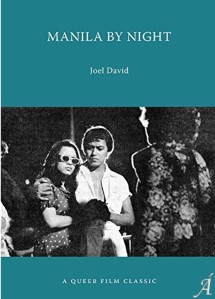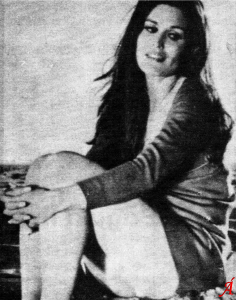
The National Pastime: Contemporary Philippine Cinema was published by Anvil in late 1990. It was launched the next year at the University of the Philippines’s Faculty Center Auditorium, with Ishmael Bernal and Ricardo Lee as guest speakers; I have not had a self-authored book launched since then until 2017. The original manuscript was in two hard-bound volumes, but the publisher instructed me to reduce the amount by half, source as many photos as possible, and prepare a glossary as well as section updates. I would have preferred none of these modifications, but they did help attract people to the volume. I insisted on black-and-white cover printing (which characterized the rest of my solo publications), used an immoderately romantic photogram I created for a student exhibit, and requested National Midweek’s resident photographer Gil Nartea to take my pic.
11011Cinemaya: The Asian Film Magazine wrote in its Spring 1991 issue that the book “chronicles and comments on trends in Filipino cinema that only an insider to the ethos can evoke…. A polemical introduction leads on to articles on the recently concluded Golden Age in Philippine cinema (1975-1985), the first having occurred in the ’50s. [The articles] illumine not only the films/actors/genres/directors under review but also an era, its atmosphere, its debates – all this with a welcome sprinkling of humor. A valuable companion to Philippine cinema” (67); in the introduction, Bienvenido Lumbera wrote: “David stands apart as a reviewer because he has been touched by film theory as no other regular critic hereabouts had been…. The vast and variegated array of feature films serving as specimens in his account of the continuities and disruptions in the contemporary Philippine film industry convinces us of his assiduousness and earns him credulity…” (x).
11011A few other favorable comments came out in Philippine Star, Manila Times, Kabayan, and Philippine Collegian.[1] The National Pastime was listed as one of the entries in the Film volume of the second edition of the Cultural Center of the Philippines Encyclopedia of Philippine Art (Vol. 6 [Manila: CCP, 2017]: 386-87); it was shortlisted for the essay category of the Manila Critics Circle’s National Book Award, where another Anvil publication, Ambeth Ocampo’s Rizal without the Overcoat, won out. [Contents below exclude the book edition’s glossary – now rendered even more superfluous in the wake of Wikipedia. Book cover design: Albert Gamos; photogram: Joel David; author’s pic: Gil Nartea; inside pics acknowledgments: Ricky Lo, Cesar Hernando, National Midweek; publishing manager: Ma. Karina A. Bolasco; dedicatees: Ma. Theresa de Villa, Ma. Luisa Doronila, Esther Esguerra, Eleanor Hermosa, and Bernadette Pablo (whose name was inexplicably omitted in the printed version). For larger image, please click on picture above or below.]
The Digital Edition (2014)
Cover design by Paolo Miguel G. Tiausas
“Bomba” © 2019 by Mina Saha
National Library of the Philippines CIP Data
David, Joel.
11011The National pastime : the digital edition / Joel David. — Digital Edition. — Quezon City : Amauteurish Publishing, [2014], © 2014.
Electronic resources
ISBN 978-621-96191-2-7 — Digital Edition
Original printed copy published in 1990 as The National pastime : contemporary Philippine cinema by Anvil Publishing
110111. Motion pictures — Philippines. 2. Motion pictures — Philippines — History. I. Title.
US Copyright Office Certificate of Registration:
TXu 2-255-114
Contents of the Digital Edition (Reillustrated)
© 2014 by Amauteurish Publishing
All Rights Reserved
[For a PDF scan of the book edition’s preliminaries, click here.]
The World According to Aguila
• Aguila (1980)
A Decent Fight
• Palaban (1980)
Romero’s Flip-Flop
• Hari sa Hari, Lahi sa Lahi (1987)
Exceptions
• Kamakalawa (1981)
• Kisapmata (1981)
Waiting for Godard
• Batch ’81 (1982)
Return to Form
• Bilanggo sa Dilim (1986)
Censorship and Other Compromises
Film Reviewing and Criticism
Where Has All the Horror Gone?
Causes for Cerebration
• Tiyanak (1988)
• Babaing Hampaslupa (1988)
Down but Not Out
• Nektar (1988)
• Tubusin Mo ng Dugo (1988)
Moments of Truth
• Anak ng Cabron (1988)
• Afuang: Bounty Hunter (1988)
Bioflicks
• Operation: Get Victor Corpus, the Rebel Soldier (1987)
• Balweg: The Rebel Priest (1986)
• Kumander Dante (1988)
An Update
Short Subjects
• Mga Kuwento ng Pag-ibig (1989)
• 3 Mukha ng Pag-ibig (1989)
Triumph in 16mm.
• Damortis (1986)
Movie(?) of the Year
• Ang Lungsod ng Tao Ay Nasa Puso (1987)
Perils of Politics
• A Dangerous Life (1988)
High-Flying
• Imelda: Paru-parung Bakal (1989)
An Update
Niño’s Comeback
• Kontra Bandido (1986)
Gross, Gaudy, & Gay
• Ako si Kiko, Ako si Kikay (1987)
Chauvinist’s Nightmare
• Kumander Gringa (1987)
Child’s Play
• Takot Ako, Eh! (1987)
An Update
Major Bid
• Bulaklak sa City Jail (1984)
O’Hara Strikes Again
• Tatlong Ina, Isang Anak (1987)
Beyond the Stars
• Oro, Plata, Mata (1982)
• Moral (1982)
Searching for Options
• Kid…Huwag Kang Susuko! (1987)
Film as God
• Isang Araw Walang Diyos (1989)
Film since February 1986
People-Power Cinema
Studious Studios
An Update
Return of the Melodrama
• Kung Aagawin Mo ang Lahat sa Akin (1987)
Mellow Drama
• Paano Kung Wala Ka Na (1987)
Failed-Safe
• Walang Karugtong ang Nakaraan (1987)
Reversals
• Misis Mo, Misis Ko (1988)
Progressions
• Isusumbong Kita sa Diyos (1988)
• Kapag Napagod ang Puso (1988)
• Nagbabagang Luha (1988)
Campout
• Natutulog Pa ang Diyos (1988)
• Paano Tatakasan ang Bukas? (1988)
• Sa Puso Ko Hahalik ang Mundo (1988)
Slugged Out
• Imortal (1989)
• Ang Bukas Ay Akin: Langit ang Uusig (1989)
An Update
Underground, in the Heat of the Night
Home Sweet Home
• In My Father’s House (1987)
Film-Writing
• Si Tatang at mga Himala ng Ating Panahon (1988)
An Update
Valiant Try
• Aliw (1979)
Renewal of Appreciation
• Manila by Night (1980)
An Awakening
• Pahiram ng Isang Umaga (1989)
Just another Exercise
• Angela Markado (1980)
Text vs. Texture
• Macho Dancer (1989)
After the Revolution
• Orapronobis (1989)
Moving Picture: World’s Shortest Prequel
Note
[1] A listing of excerpts:
• “This marvelous book by a young critic follows closely on the heels of the product of a senior Manunuri [Emmanuel Reyes’s Notes on Philippine Cinema], but does not suffer in comparison. David’s strengths lie in his wide reading, deep thinking, tireless research, and patient viewing. He is not afraid to show his bias, nor does he hesitate to judge if a film is worthy or unworthy of serious study. Although originally written for instant publication in mass newspapers and magazines, these essays transcend journalism and generally reach what David himself calls film criticism as opposed to mere film reviewing” (Isagani Cruz, Philippine Star, Feb. 28, 1991, p. 10).
• “One thing that David is capable of doing, and doing better, for that matter, than any other film critic hereabouts, is the uncanny ability to locate a film in the context of a director’s body of work, and in some cases, even against the backdrop of industrial practices. Herein lies one of David’s probable contributions to Philippine film criticism: the recognition of the fact that film is an industry which has its own rules and priorities. In fact, the industry should listen to David once in a while because he seems to speak for it…. Surely, David’s grasp of film technique and operations and his sensitive feel for film’s industrial character make him one of a kind in the arena of the untalented. For a first effort, actually a decade of work, an opening salvo maybe, David’s work will surely find a comfortable place in Philippine film criticism’s galaxy of stars. David is young, bright, smart, nice, and definitely miles ahead in intelligence and sensibility” (Patrick D. Flores, Manila Times, March 17, 1991, p. B10).
• “So far I find most of David’s ideas startling…. But if I were to make any conclusion at this point, it’s that I can’t help but agree with what he says” (Mauro Feria Tumbocon Jr., Kabayan, Dec. 17, 1990, p. 4; trans. from Filipino).
• “[David] combines traditional cinematic knowhow with keen understandings of semiotic, postmodern and at times neo-Marxist theories plus an appreciation of cinema’s popular nature” (Reginald Vinluan, Philippine Collegian, Jan. 29, 1996, p. 7).














 ORCID ID
ORCID ID 